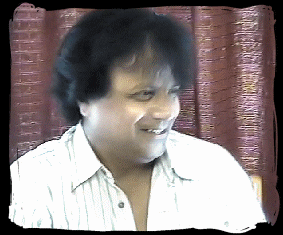Tadition & Modernity in Indian Classical Music performance

Tadition & Modernity in Indian Classical Music performance |

|
By Dr. Chandrakant Sardeshmulh |
Dr. Chandrakant Sardeshmukh earned his Ph.D. on Samaveda as the basis of Indian Classical Music on insistence of his father who held that talent alone is insufficient; one must study as education has no alternative. Having studied Sitar with Pt. Ravishankar and Padmashree Annapurna ji from age of 7 to 23 years, Dr. Chandrakant has pursued his career away from his homeland. He expresses his opinion on tradition and individuality -- |
 |
Indian musical tradition dates back to Veda-s. It is based on those fundamental principles without which music would lose its definition. A Guru helps the learner internalize these essentials. Yes, the Guru does structure the disciple's ability to play, but he does not limit it! When I sit down with a piece, all memories associated come to mind -- what Ma had said, how Guruji played it at such and such place. Fortunately I belong to a tradition that has always stressed identity of the individual. I have been taught that in my renditions I should always portray the tradition but at the same time, present my own musical response. I do not exactly remember the context -- I was so young, then -- but there was a discussion going on regarding teaching practices. It was said that even if a boy could be prepared to emulate Guruji so well that on blind listening even an astute critic would be unable to differentiate between them, still the boy would never become a Ravishankar because Ravishankar is one and unique. So, I understood at that moment the difference between a duplicate and an original. Later when I grew up I realized That Indian music has evolved through individual efforts which operating within traditional framework have modified or extended its boundaries. Look what Baba (Padmashree Ustad Allauddin Khan) had done! Even while his students studied with him under the Gurukul system, Baba never let them suffer from narrow Gharana vision. He did not teach them style, he taught them music!
Ravishankar ji plays in one way, Nikhil Banerjee in a different way. Ali Akbar ji establishes Sarod with a different exploration of sound and melody than does Sharan Rani ji. Someone plays flute, other one plays violin and a third plays Surbahar. All of them play their instruments in a unique way and enjoy music making but still are all threaded together by their tradition -- discovering music with Baba.
The young generation might be overjoyed by this endorsement to individuality. As it is they tend to make their presentation "unique" by mix-and-match (right now, there is no cut-and-paste in live music). Most modern musicians have learnt with several Guru-s of differing traditions and so feel that they have have a right to present their brand of cock-tail of all these Gharana-s. The spirit of individuality is not so superficial. I have had the opportunity as a child to listen to Paraj from Kesarbai Kerakar ji, Mogubai Kurdikar ji, but Mansur ji's rendition remains in my memory -- powerful and ever-fresh. The way Mansur Saheb presents a Bilawal or a Sorath emphasizes both -- the individuality of the performer and of Gharana. Because a school gives thought to inter-relationship of notes within a Raga and only after perfecting a balance presents this as its style. Now, when a youngster takes one appealing phrase from this Gharana and a second from another, thinking that his selection makes his presentation unique, he is mistaken. He has destroyed integrity of both styles. Both styles determine the balance in their unique way. They both have a starting point along which the development comes naturally. You have select one and continue with it -- change can come from within not from outside.
My appeal to all practitioners of Indian classical music is that they should learn and practice as "music" and not as special collection of sounds. The modern generation seems so excited with gadgets to improve tonal quality of their instruments that production of adequate sound becomes their priority. They neglect the truth that Indian tradition practices individuality in a paradoxical manner -- in suppressing it rather than expressing or establishing it. Music is aimed at sublimation of self -- your individuality lies in the manner you attempt to achieve this goal.

Links :
Darshanam: Dr. Chandrakant Sardeshmukh's home page
Devotion: Compact Disk. Chandrakant Sardeshmukh, Sitar. Darshanam:2003. Review
In my view : Pt. Rajshekhar Mansur
In My View: Ustad Vilayat Khan
In my view : Sanjoy Bandopadhyay